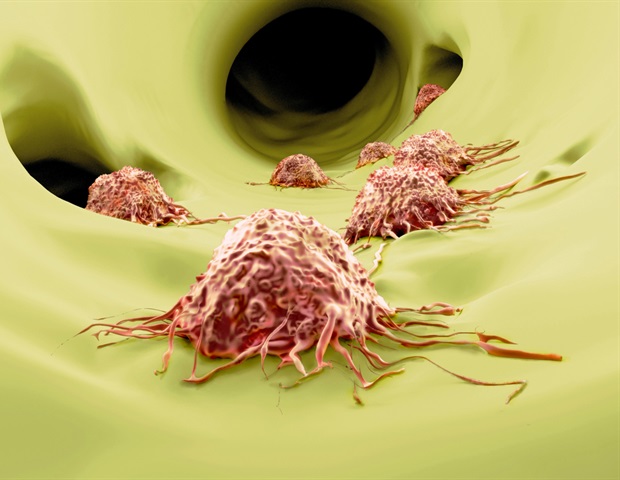Researchers at the Spanish National Cancer Research Centre (CNIO) propose a new treatment for brain metastases that respond poorly, or not at all, to immunotherapy, and provide a biomarker to predict in which cases it should be used.
Our bodies have a mechanism to destroy anything that attacks it, be it viruses, bacteria or cancer cells: the immune system. Cancer grows when tumor cells fool this system into not attacking them. Cancer immunotherapy uses drugs to prevent cancer cells from blocking the immune system, but immunotherapy doesn’t always work.
For brain metastasis-;when a tumor that started in another organ spreads to the brain-;immunotherapy has recently been tried, with mixed results.
“Brain metastasis poses a serious clinical problem,” explains Manuel Valiente, head of the CNIO Brain Metastasis Group and director of the study whose results are now being published. “Patients with advanced brain metastases, that is, those who can already perceive symptoms of metastases, don’t respond well to immunotherapy. But even patients who respond well to immunotherapy increasingly relapse, often because of new metastases in the brain.”
In other words, immunotherapy combined with blocking antibodies doesn’t seem to be the optimal way to fight brain metastasis. One possible reason is the presence of the blood-brain barrier, a kind of permeable membrane that filters blood entering the brain to protect it from toxins. But this vascular barrier also hinders the entry of antibodies used in immunotherapy. Without antibodies, immunotherapy doesn’t work.
Astrocytes that ally with cancer
The CNIO group now proposes a very innovative hypothesis to combat this problem. They present it in the journal Cancer Discovery, published by the American Association for Cancer Research.
We have discovered,” explains Neibla Priego, first author of the paper, “that certain brain cells called astrocytes act as immunomodulators, that is, they interact with the immune system in the brain, and in cases of brain metastasis they misuse this function because they are being influenced by the tumour.”
Perverted in this way by cancer, astrocytes ally with tumor cells when brain metastasis occurs. The interaction of astrocytes with the immune system, which should be a normal process of immunomodulation, becomes a mechanism that fuels cancer, because astrocytes interfere with the work of defense cells and prevent them from killing tumor cells.
A biomarker of metastasis where immunotherapy won’t work
The CNIO group has identified a key molecule in the process, called TIMP1. “Pro-tumour astrocytes produce TIMP1, and this protein is involved in disabling the defensive cells that should kill cancer cells,” says Priego.
Having demonstrated that this molecule, TIMP1, acts on immune system cells and renders them less effective, the CNIO team proposes to use it as a biomarker to detect brain metastases affected by this immunosuppressive mechanism.
“TIMP1 is a good biomarker, because it is secreted in significantly higher amounts in the cerebrospinal fluid of patients with brain metastases,” says Priego.
Drug targeting pro-tumor astrocytes in trials
The study goes further. Manuel Valiente’s group proposes a therapeutic alternative that targets astrocytes: the combination of immunotherapy with inhibitors that prevent the production of the TIMP1 molecule.
“There is a drug called silibinin, which has already been employed on a compassionate use basis, which inhibits the production of the TIMP1 molecule,” says Valiente. “A clinical trial is already underway to test its therapeutic efficacy in brain metastasis. We hope to have the results in 2025.”
The goal is to combine TIMP1 inhibition with traditional immunotherapy, “which would increase the potency of the therapeutic strategy and facilitate its incorporation into clinical protocols,” says Valiente.
Advances in basic knowledge
The researcher also highlights the other value of the work: to reveal the role of astrocytes in the disease, “unmasking their heterogeneity and targeting only those subtypes of astrocytes with an altered and negative function for the patient.”
“Until now, astrocytes have not been considered as immunomodulators, either in general studies or in relation to brain tumors. Our research is not only innovative from a clinical point of view, but also very useful for the advancement of scientific knowledge,” says Valiente.
This work has received funding from several national institutions, such as the Spanish Association Against Cancer (AECC), the Spanish Ministry for Economy, Trade and Enterprises (MINECO), the Carlos III Institute of Health, ‘la Caixa’ Foundation, Ramón Areces Foundation or La Marató de TV3 Foundation. It has further been funded by international entities such as the European Research Council (ERC), the European Union via Next Generation Funds, or the European Molecular Biology Organization (EMBO).
This article was originally published by a www.news-medical.net . Read the Original article here. .


